Bollywood’s top screenwriter plus producer duo, Reema Kagti, Zoya Akhtar, decode the craft behind their art
Zoya Akhtar and Reema Kagti with mid-day’s entertainment editor Mayank Shekhar at the latest edition of Sit with Hitlist. Pics/Aishwarya Deodhar
Made in Heaven, that’s wrapped two seasons on Prime Video—surely, you’ve seen it already—is an episodic series. In the sense that ensemble characters and stories change, with each episode, while the leads remain the same.
ADVERTISEMENT
That is, Tara (Sobhita Dhulipala) and Karan (Arjun Mathur), who are BFFs/soulmates, single, sharing life together—also business and creative partners, at a wedding planning firm. Which involves stressful planning and production, some scripting, and creativity, too. Not very different from filmmaking itself.
It’s only while watching the show’s second season that it occurred to me—hey, these two protagonists could be inspired by the life of the screenwriting plus producer duo, Reema Kagti, Zoya Akhtar, who are behind the show themselves; no?
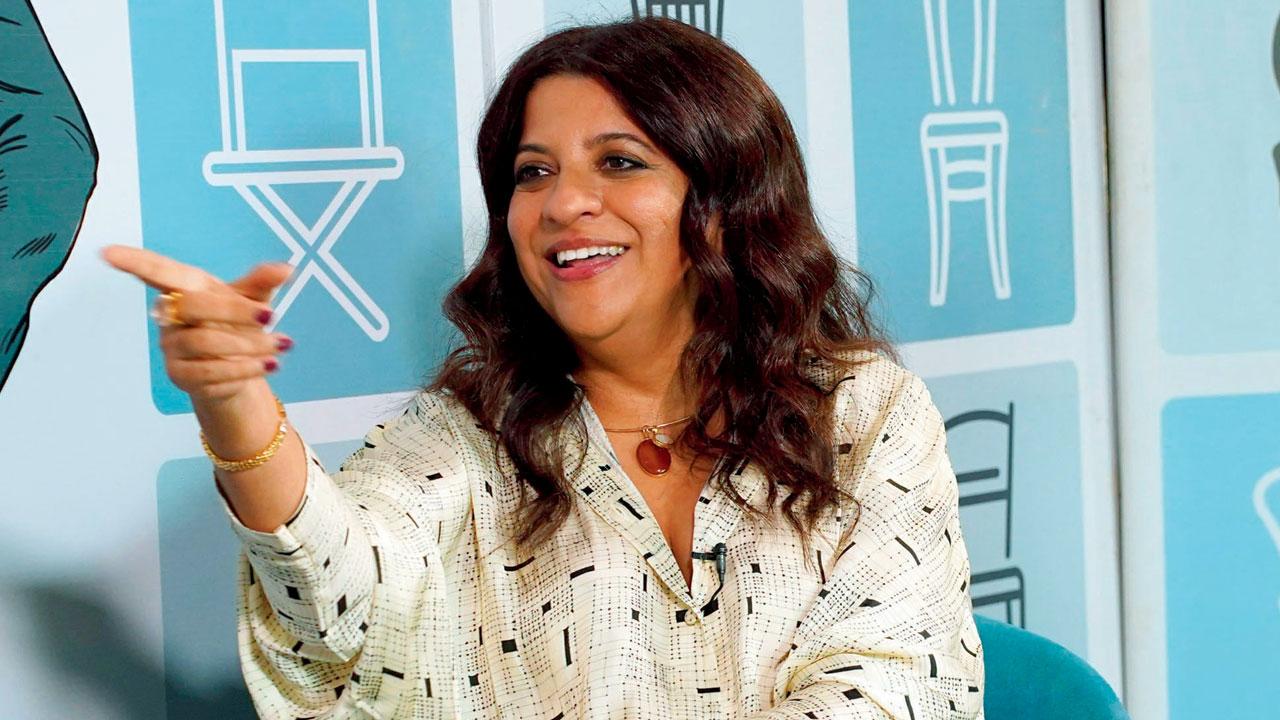
Zoya Akhtar
“No. Well, work-wise, yes. But not [so much] socially,” Zoya argues, when I bring this up. Although Reema concedes, “When we were discussing [the show, with co-writer], Alankrita [Shrivastava], this did come up—if we have set the people on ourselves. Definitely the friendship, where they are also kinda soulmates. Not that Zoya and I are soulmates.”
They are “professional soulmates,” they concur. So, the social lives are largely separate? “We do have the same gang, when we hang out. But let’s just put it this way: Zoya is extremely social. I’m absolutely anti-social,” Reema laughs.
The two have remained friends and colleagues for over two-and-half decades. Starting out as assistant directors (ADs) on Kaizad Gustad’s Bombay Boys (1998). And with a combined filmography of over 10 films/shows as credited writers on the screen, since.
Yet, while we know enough about Zoya’s background, famously daughter of writers Javed Akhtar and Honey Irani—we barely know anything about Reema.
I’ve scoured the Internet, before meeting them. It hasn’t helped much. Most of her video interviews online are with Zoya. Reema’s calmingly chilled, securely quiet. Which sufficiently explains the “anti-social” self-description, doesn’t it?
Reema says she grew up in Assam. Went to a boarding school, Loreto Convent, in Shillong, Meghalaya: “Back then, there were hardly any good schools in Assam, so it was common for parents to send their kids off to boarding schools. Unlike in bigger cities, where only the naughty kids got sent!”
She was admittedly a naughty kid, though: “I used to make my parents’ lives hell. But they were supportive.” Not as much for her filmmaking ambitions, initially.
“I think my father had this very 1980s, ’90s notion of Bollywood. He was very disappointed [with my career choice]. It’s only when I got him to watch Lagaan, that I was an AD on, that he said, okay—if this is the kind of films you want to make.”
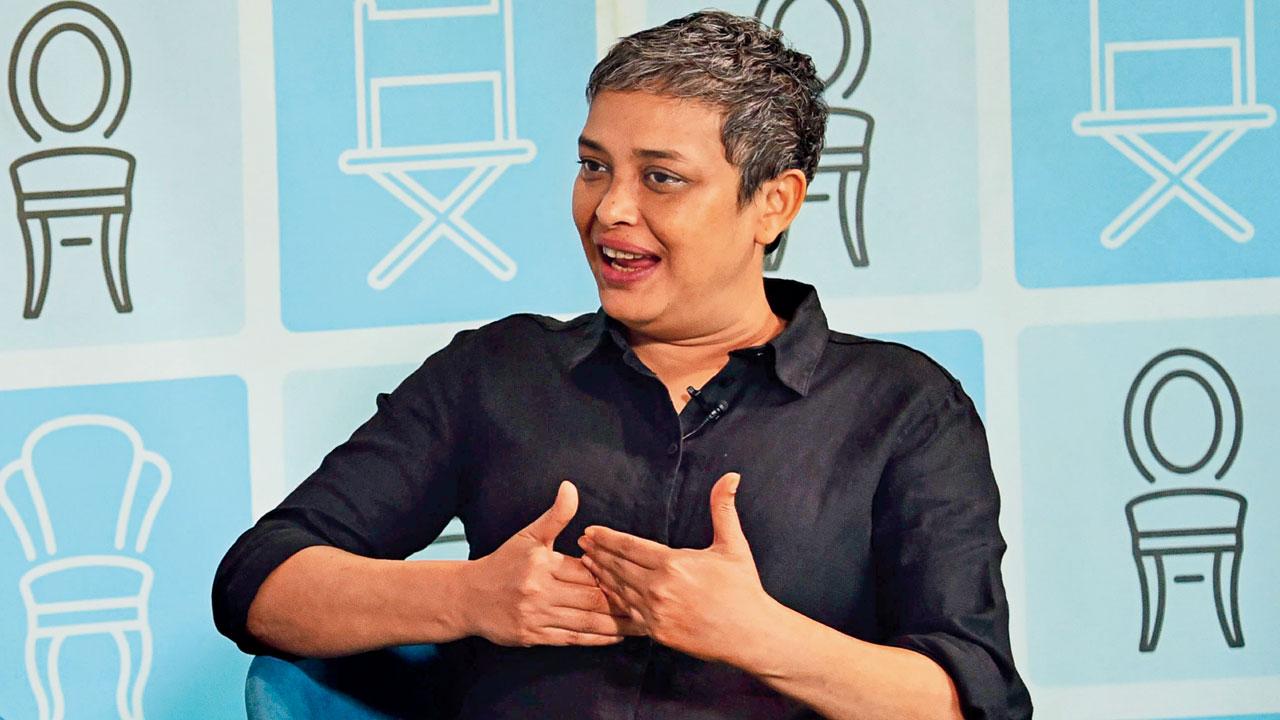
Reema Kagti
Reema’s father was an engineer at an oil company, before leasing out a 350-acre land to farm, “four hours’ drive from China”. The umbilical cord with her home-state remains.
“You can’t really outgrow your roots. My cook is Assamese. I eat Assamese food. My family is back in Assam.” Reema had moved to Bombay for college, at Sophia, and thereafter a course in social communications at the media school, Sophia Polytechnic.
“At some point, I bumped into Zoya. We liked the same kinda films, had a lotta common ground, we began writing small stuff together” she trails off.
To be more precise, this was during the auditions for Bombay Boys (1998), where Reema was already an AD. Zoya had dropped in for the same position.
Zoya had been an AD on Dev Benegal’s Split Wide Open (1999), after returning from a diploma in filmmaking from New York University (NYU). She had assisted in the costume department on Mira Nair’s Kama Sutra (1996), before NYU.
“Only, the director, Kaizad, was keen to test Zoya for Tara Deshpande’s part in Bombay Boys,” Reema recalls. She was staffing the audition. Right after which, Zoya told Reema, “I’m the world’s worst actor!” Reema replied, “Listen, I don’t think you’re getting this job either!” Well, she got the job she wanted.
Which was as a freelance AD, the rotating culture of which only spawned in Bollywood in the late ’90s, early ’00s: “We were moving into a phase of sync-sound on the sets, shoots getting wrapped in a single schedule.
“To pull that off, you needed a more structured system. Unlike before, when films would take years to finish, and everyone just hung around in offices—there would be 12 ADs, and everybody did everything,” Zoya says.
Reema had earlier worked on Rajat Kapoor’s directorial debut, Private Detective: Two Plus Two Plus One (1997): “That was my film school. I got to dabble in all departments of filmmaking.” But there was one thing both Zoya and her were clear about—they were not going to assist only one person, throughout, which was, at the time, the common practice.
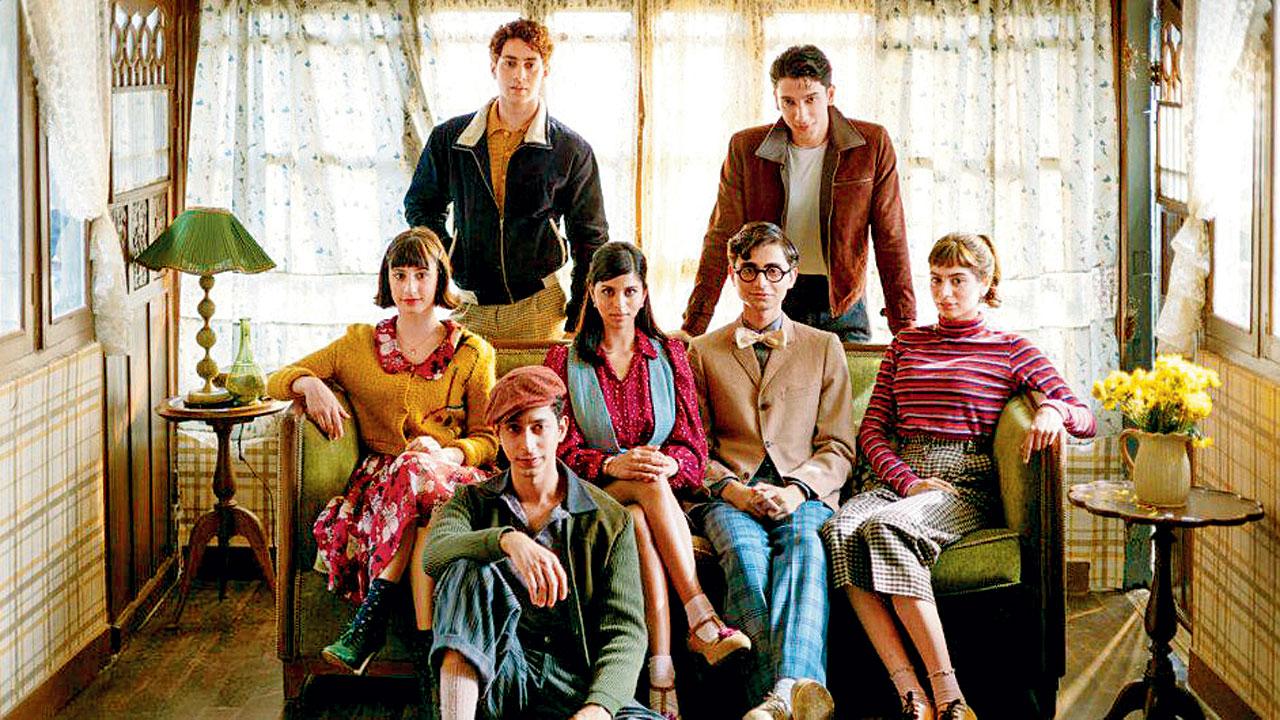
Zoya says, “I don’t know how we had the guts to take that call. Back then, ADs were associated with particular filmmakers, or even production houses, when it came to advertising. There was a ‘chhaap’ [creative trademark] of that director, that remained with you, even once you left them and went your own way.”
Sensing a trap, neither wished to mirror particular mentors. Writing and directing their own movie was the end-goal, anyway. They got to work on multiple sets, when they did; and wrote their own scripts, when they didn’t. It was around this time they decided to script a short film together.
Zoya remembers, “We almost killed each other—let’s do this, let’s not do that, etc. Later, I wrote Luck By Chance (2009). Reema started writing Honeymoon Travels Pvt Ltd (2007). We gave our scripts to each other for feedback. She finished the portions I got stuck at. Likewise, me with Honeymoon. While we hadn’t credited each other, we were on each other’s films.
“Because this worked out so well—plugging holes in either script—after that, we just wrote together. Talaash (2012) was the first script we developed [as a team], from scratch.” Zindagi Na Milegi Dobara (ZNMD, 2011), arguably the finest Bollywood entertainer in the ’10s decade, was their second.
It’s not like the creative bickering, if you may, has stopped, or receded. Zoya admits, “People around have just got used to it in our office.”
Reema laughs, “This one time [producer] Ritesh [Sidhwani] told us, you should just not work with each other anymore. During ZNMD, [Zoya’s mom] Honey aunty got a call from the neighbours—something is going on in your house; please, it’s really scary, people are shouting!”
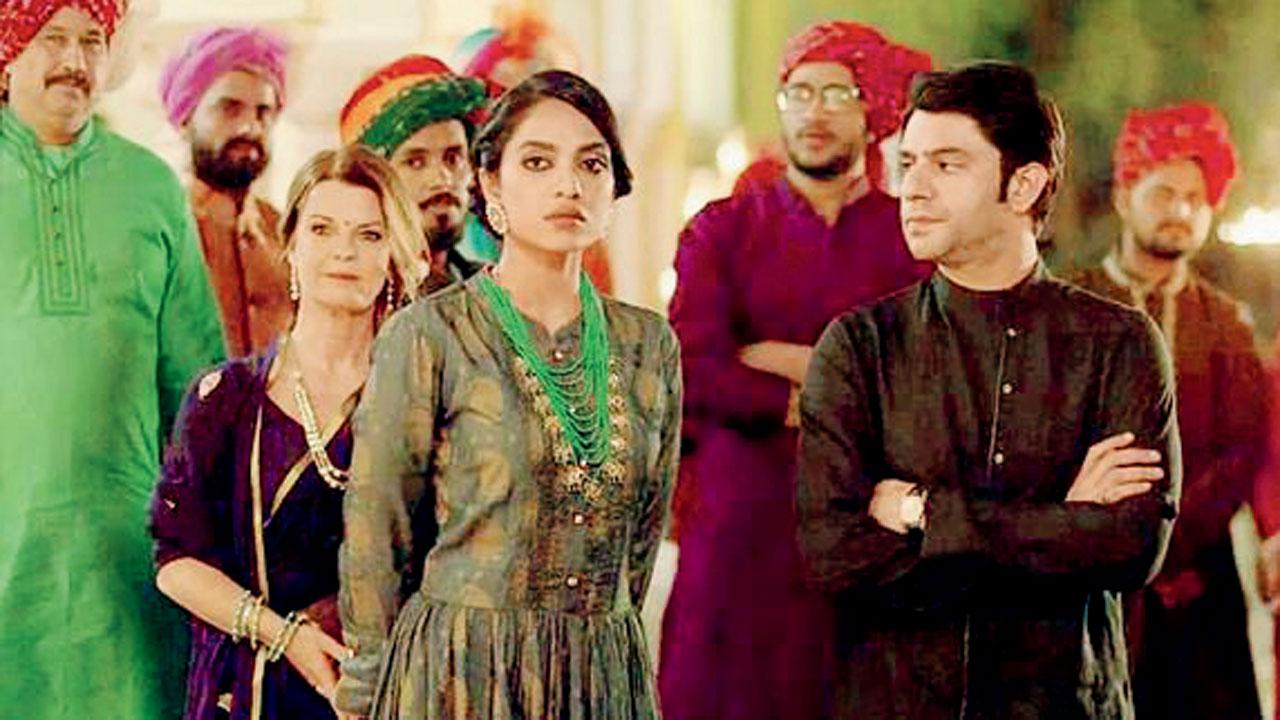
The art of their conflict management is pretty simple, though: “Show up at work. If we are writing, it’s 10 am. No muse is gonna come. If nothing is happening, we just do other things, watch movies, just chat, gossip… Also, you should never be afraid of scrapping what you’ve done, and starting all over again,” Zoya says.
With Reema, it’s even simpler: “If you’re stuck with an idea, and neither is able to resolve it, let it stay—move on to other things. Later, you return to those ideas, and the better argument, once it stays with you, eventually wins. It works well, if you have the story first.” They’re sure of the story’s end, beforehand; working themselves backwards.
In terms of agreeing to disagree, between them, the one who’s directing the film, gets the final say: “Otherwise, we will never stop arguing.”
For instance, in the Netflix original, The Archies (2023), Reema wasn’t convinced about the placement of a song that would break the narrative: “But once I saw the way Zoya had outdone herself with the visualisation, I knew she was right. It is my favourite song.”
In terms of success stories among screenwriting pairs, none beat Salim-Javed in Bollywood still. As in, script starring Salim Khan and Javed Akhtar, in the opening credits. The latter, of course, being Zoya’s father.
Only lately has Javed begun to decode how the partnership worked, having kept mum, since it broke up at the turn of the ’70s decade.
It’s clear now that Salim was the scenarist and the plot-guy, while Javed was the man of words. For instance, as Javed has mentioned before, the greatest twist in Chandra Barot’s Don (1978)—the fake don reveals, inside the jail, that he’s not the real one.
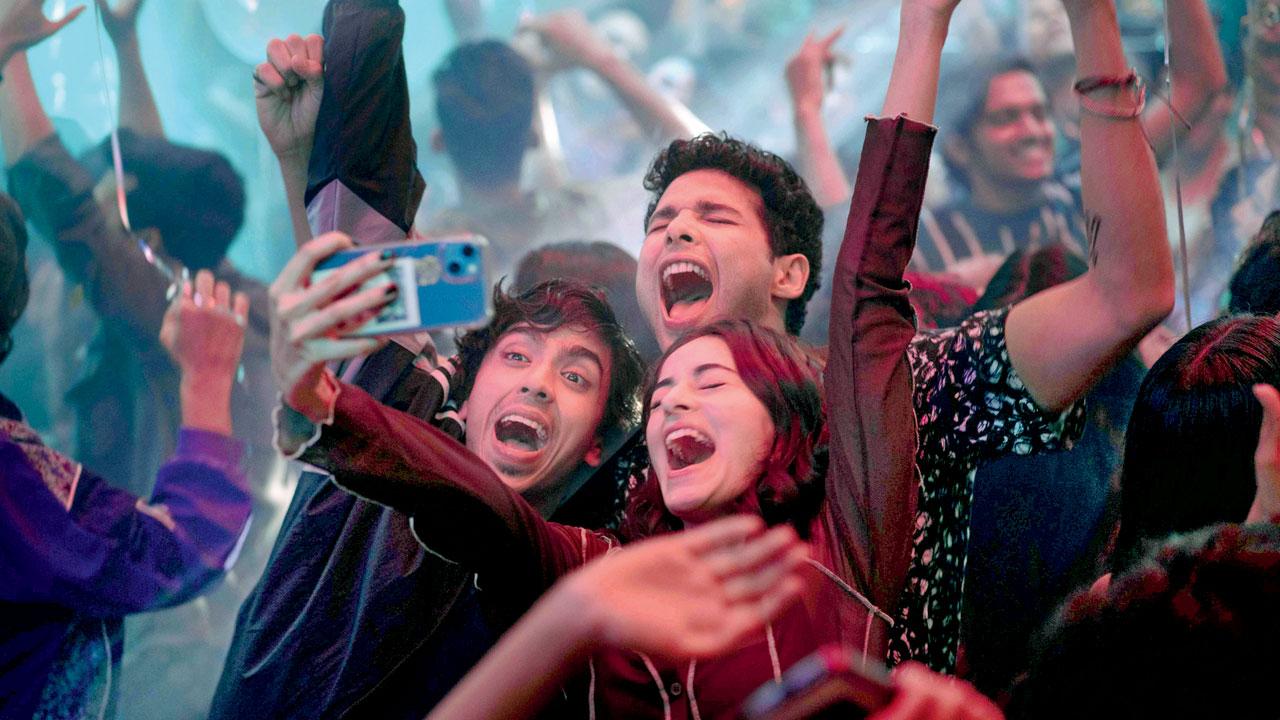
Wherein, the cops don’t believe him still. But his consiglieres, for inmates, instantly do. The dilemma worsening for the protagonist—he’s stuck between both lots, who’re gonna kill him, regardless. Now, that was Salim’s idea!
But, say, the Don’s line, “Mujhe do tarah ki ladkiyan pasand nahi aati. Ek woh, jo mere pass aane mein bahut der lagayein. Aur ek woh jo bahut jaldi aa jayein. (I don’t like women who take too long or too little time to attract).” Now, that’s decidedly Javed!
It’d be great to hear Zoya-Reema similarly break down their own scripts. Firstly, Zoya exclaims, “This comparison is freaking me out. Nothing of the sort [of Salim-Javed] had happened before, or will happen again. They were 22 blockbusters down. Let’s not put us in the same sentence!
“[That said], our strengths are very different. We talk, talk, talk. We align on themes, characters, story, and what the film is about. Then, Reema is very strong and succinct with structure and screenplay. She gets to the point. I tend to soak.”
Reema couldn’t agree more, “The editing! You give Zoya a 100-page script, she’ll send you back 120 pages. I’m, like—what have you edited, you’ve added! But she’s better at nuances, layering, characters. And dialogues, of course.
“Zoya feels all my characters sound like me! But she can be lazy. Zoya will refuse to write the first draft of the screenplay, once the events have been fleshed out. So, on the dialogues, I just make everyone sound like me. Because I know she will fix it!”
Zoya adds, “I get lazy, yes, but once Reema does the barebones, I take it, and juice it. I write the dialogues in English. If you want to shoot the film in English, the screenplay is completely ready.
“Then, it goes to one of my family members—brother, Farhan (ZNMD, Dil Dhadakne Do, The Archies); father, Javed (Luck By Chance), or Vijay Mourya (Gully Boy)… They know what I want, putting it into the syntax that works best in Hindi.”
The Archies, in that sense, for the way the audiences would have watched it globally, is closest to the original screenplay with English dialogues then? “The person subtitling might approach it differently, but the English draft is the template for it,” Reema says.
While writing, per se, is a solitary job—it’s in the parleys between each other, bringing out personal experiences and influences—that the Zoya-Reema script essentially comes together.
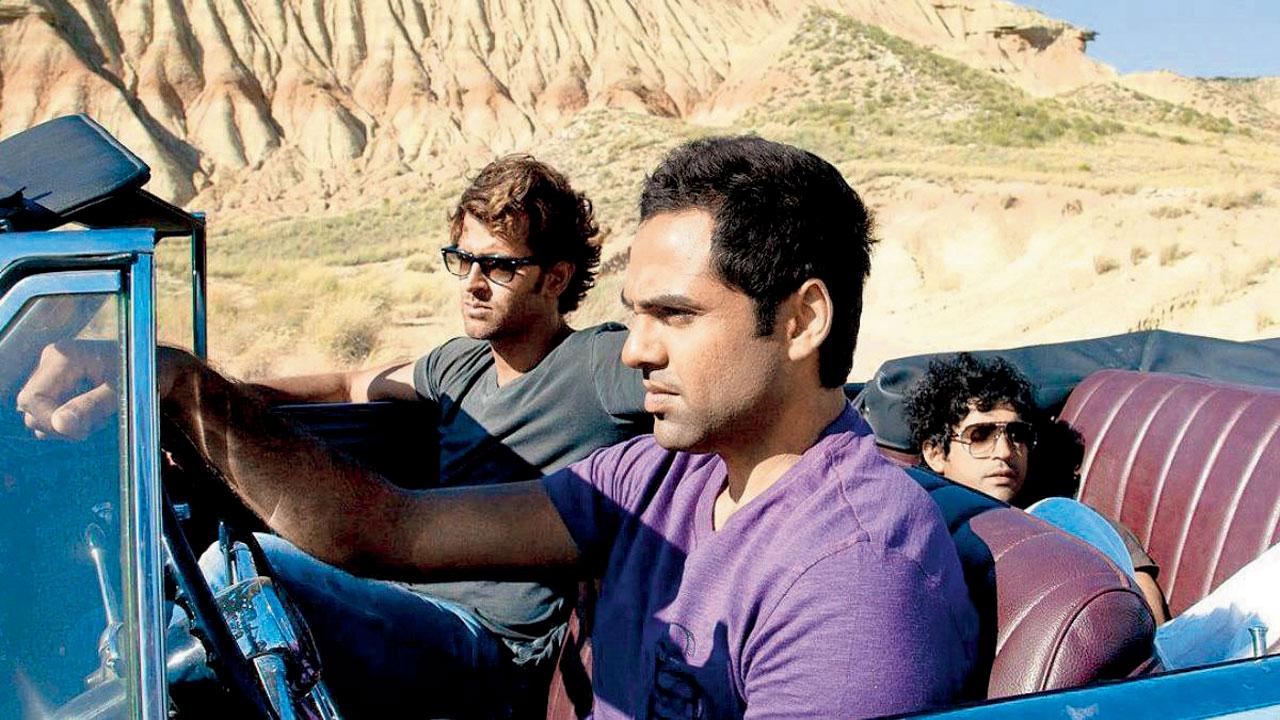
Alia Bhatt’s character, Safeena from Gully Boy (2019), was originally supplanted from another film that Reema Kagti wrote.
I ask Zoya to quote examples, where there’s fully Reema in a script, that she’s directed. She points to Alia Bhatt’s part in Gully Boy (2019): “Safeena was the character, from Dharavi, in a script, that Reema had written for her movie.
“That film didn’t happen. But I fell in love with her. I asked her if I can just take Safeena. Yeah, why not! We supplanted and then adapted her to fit into the world of Gully Boy.”
For something more specific, in terms of moments, Zoya cites, “The scene in ZNMD, with Laila (Katrina Kaif) chasing Arjun (Hrithik Roshan) down on the bike, and kissing him! The point of the film was to follow your dreams; live in the now.
“Reema said Laila needed to do something [to capture that essence]. She can’t just say it. Let’s have her kissing him outside, and let her leave!”
This ready-to-film screenplay cooked between partners is also how Salim-Javed operated, staying within the realm of screenwriting still—a reason some ’70s directors fell off the crevice, once Salim-Javed were unable to send them bound scripts any longer.
For Zoya-Reema, it’s merely the end of a process: “A big hurrah moment,” as Zoya puts it. The actual movie can’t film itself. How’re they different as directors from thereon, I ask Reema, who has, thus far, directed Honeymoon, Talaash, Gold (2018), two seasons of Made in Heaven, the series, Dahaad, and the feature, Supermen of Malegaon, that’s on its way.
She says, “Zoya visually references a lot. I tend to arrive at the visual world, after recce-ing [locations].” Zoya agrees, “It is, after all, a visual medium. I like to find a visual tone, seeing the film from before, and start recce-ing it, accordingly; to lift it off the page.”
Zoya, evidently, has her clear list of dos and don’ts as well. For instance, she was certain before the filming of Gully Boy, set in the slums, that there will be none of Bombay’s tarpaulin-blue throughout the film: “I just don’t like the colour.”
Likewise, with The Archies, the setting would be dreamy, hence, visually, story-book like: “full framing, wide-lensing, classical shots, like 1950s-60s photography.” With Dil Dhadakne Do: “mainly mid-shots and long shots, because the picture is from the POV of Pluto, the family dog.”
Besides screenwriting and direction, there’s the graduating aspect to their creative careers, which is as producing partners. Gully Boy was the first film with Zoya-Reema’s film company, Tiger Baby.
The name, by the way comes from “the nickname that Anurag [Kashyap] and all” gave Zoya: “It’s my spirit animal!” Left to Reema, the company would’ve been called Balls of a Brass Monkey: “Zoya is like, don’t be ridiculous! Also, Tiger Baby is fierce and feminine. It has a nice ring to it.”
Even as producers, the two couldn’t be as complimentarily separate from each other. As Zoya deciphers, “I’m the one meeting with the actors, Reema doesn’t wanna go anywhere.
“She’s better with budgets, and numbers. But both of us are into mentoring scripts. She’s better at creative packaging and producing. I handle the Tiger Baby social media.” Reema sighs, “I can barely do mine.”
An upcoming production of Tiger Baby is a documentary on Salim-Javed.
If you were to strain yourself to find connecting dots, if not a larger link, between each of Zoya-Reema scripts, it might be the fact of alternating worlds, perhaps.
Say, in the OTT space, their two releases in 2023 were Made in Heaven S02, and Dahaad (both on Prime Video). One is set around the blingy world of posh, New Delhi weddings.
The other is a police-procedural in the rugged terrains of Rajasthan, following missing women, and a serial killer on the loose.
Likewise, with films, The Archies, on Netflix—with “idealism for its point”, in the near-perfect, imaginary world, mimicking the American comic book, in 1960s India—comes after Gully Boy, that went deep into Mumbai’s underclasses. Which, in turn, came after Dil Dhadakne Do, dealing with importantly familial, but First World issues.
Zoya-Reema obviously don’t see it this way: “We just follow the world our characters live in. It’s about being authentic to the world you’re trying to create,” Reema says.
Zoya adds, “We are avid readers and movie watchers, fans of various kinds of filmmakers, not fixated on a genre. For instance, I’m actively looking for something in the big crime/underworld space. It’s exciting to be scared [trying new things]. I’ll be bored waking up for work, otherwise.”
The ideas, of course, can come from anywhere, Reema argues: “Supermen of Malegaon was a documentary. Gully Boy came from a music video. With ZNMD, it was road trips taken [by us]. We’d also gone on a Europe tour, with Zoya and a bunch of friends. Zoya just wanted to follow around three boys, no hair/make-up, for ZNMD. Of course, it didn’t end up that way.”
One of those inspiring trips was when Reema, a “broke AD”, was in Goa, having spent all her money, with none left for a bus-ticket back to Bombay. She hitched “a car-ride with the sister of a friend. Throughout, [the host was] cautious of a plastic bag in the backseat, because it had an expensive vase, or something. We named that bag, Priscilla.”
This is how Bagwati in ZNMD came into the scene. Only, Reema hadn’t even heard of a Birkin: “What’s that Berk, Berk, whatever. When Zoya told me about it—I’m like, why would someone pay lakhs for a bag? I wanted [the motif] to be something breakable in the film. Zoya’s the director. I had to go with her!”
With ZNMD, Zoya says she was looking at a low-budget, easy-peasy production, given she had just got off a huge ensemble cast debut, Luck by Chance.
Which was about an actor getting a shoe-in to showbiz. The Archies, in that sense, is her coming full circle, since the film launched seven debutants. If she was to make Luck by Chance, how different would it be, a decade-and-half later, give how much entertainment as an industry itself has changed since?
“If I have to revisit, rewrite, I don’t know what [Luck By Chance] will be. But, thematically, it’ll still be about success, and failure. That’s what the film is about—how do you define success, and failure? Is your self-worth determining both? The rest is backdrop.”
A widely shared clip online, from Luck By Chance, is superstar Shah Rukh Khan’s (SRK) cameo in it, where he gives life’s lessons to the lead character (Farhan Akhtar). Given The Archies marked the acting debut of SRK’s daughter, Suhana, I wonder if Zoya ever got SRK over to the set, for a Chak De India type pep-talk, to a full team of debutants? “No. That is supposed to be my job!”
That pep-talk in Luck By Chance was essentially about never leaving behind those who’ve known you from before success/stardom—when it appears that you’ve probably moved ahead. Zoya says, “Shah Rukh, as a person, typifies that.” In terms of rallying the OG troops around her, so does she.
Zoya sorta admits, “I do like working with the same crew. Because they’re great at their job. There is trust, and a sync of aesthetics. Which is not to say I won’t work with someone new.
“Suzanne [Caplan Merwanji] was the set-decorator, when I was a production assistant, on Kama Sutra. [Editor] Anand Subaya and I went to school together; [costume designer] Arjun Bhasin, [hair stylist] Avan Contractor… So many around me have been friends since teens and tweens.
“There’s Ritesh [Sidhwani], Farhan… Also, then, I enjoy going to work. I work a lot. I don’t want life passing me by, while I’m isolated, working 13-14 hours, a day. The friends are there.”
Friendships also being a recurring theme in Zoya-Reema scripts, if you casually glean through them. They could claim a friend-verse of their own. Starting out, Zoya-Reema worked as ADs on Farhan’s Dil Chahta Hai (DCH, 2001). Both believe Farhan, their former boss, to be the more methodical director, sharp with his final edits, even while on set.
Together, with DCH, and ZNMD, Netflix placed three hoardings in Mumbai, before the film Kho Gaye Hum Kahan (KGHK) dropped on the platform—terming them movies that defined friendship for their respective decades. I kinda agree.
Tiger Baby’s KGHK, directed by debutant Arjun Varain Singh, is probably the only Zoya-Reema script that neither has filmed. It peeks into the life of GenZ, through three buddies (Ananya Panday, Adarsh Gourav, Siddhant Chaturvedi), who also somewhat embark on a professional partnership together.
This is not a love triangle. It’s about friends, who are also family. They are not seeking healthy romance, but fulfilling companionship.
You sense that mental intimacy with the male-female leads over two seasons of Made in Heaven as well. I reckon, that’s the future of relationships. Zoya-Reema get that. Better than others.
Zoya and Reema’s legacy
Honeymoon Travels Pvt Ltd (2007)
Zindagi Na Milegi Dobara (2011)
Talaash (2012)
Bombay Talkies (2013)
Dil Dhadakne Do (2015)
Gully Boy (2019)
Made in Heaven
Dahaad (2023)
The Archies (2023)
Kho Gaye Hum Kahan (2023)
 Subscribe today by clicking the link and stay updated with the latest news!" Click here!
Subscribe today by clicking the link and stay updated with the latest news!" Click here!







